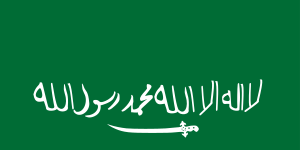伊赫萬
| 伊赫萬 | |
|---|---|
| الإخوان | |
 伊赫萬組織的旗幟 | |
| 國家或地區 | |
| 指揮官 | |
| 領袖 | 費薩爾·達爾維希 蘇爾坦·本·巴賈德 扎伊丹·本·希斯賴恩 |
伊赫萬(阿拉伯語:الإخوان,意為「兄弟會」),又譯阿赫萬[1],是沙特家族首領伊本·沙特於20世紀初期創立的軍事組織,由貝都因游牧部落民組成。伊赫萬組織是伊本·沙特軍事力量的重要組成部分,在伊本·沙特的擴張戰爭乃至最終建立現代沙特阿拉伯的過程中扮演着重要作用[2]。伊赫萬也是沙特阿拉伯國民警衛隊的前身[3]。
伊本·沙特藉由伊赫萬組織打破貝都因人的部落親緣關係,安排他們定居到內志沙漠的水井和綠洲一帶,促使其從游牧民轉向定居生活[4]。同時,這些轉入定居的游牧民統一聽從伊本·沙特的指揮,為沙特家族作戰。同時出於沙特家族的瓦哈比派背景,伊本·沙特希望伊赫萬成員摒棄不符合教義的習俗,改信瓦哈比派的教條主義信仰,並通過征戰實現修行[5][6]。至1923年,伊赫萬的定居城鎮已經達到72處,平均人口千餘人[5][6]。
1924年,伊本·沙特徵服漢志地區,一些伊赫萬成員此後私自進攻英國保護下的外約旦、伊拉克和科威特,和伊本·沙特有所分歧,伊赫萬領袖認為他屈從於英國人的殖民主義和帝國主義;伊赫萬組織亦主張以罕百里學派治國,但伊本·沙特則堅持「因地制宜」,違背瓦哈比教條而寬容部分什葉派穆斯林,成為另一分歧[7][5]。1928年,伊赫萬領袖蘇爾坦和費薩爾起兵反叛,於1930年被基本平息,大部分伊赫萬叛亂者被處決[8]。
圖集[編輯]
-
伊赫萬軍隊
-
伊赫万旗幟
-
領袖費薩爾的畫像
-
領袖蘇爾坦的畫像
參見[編輯]
參考文獻[編輯]
- ^ Chisholm, Hugh (編). Akhwan Movement. Encyclopædia Britannica 第12版. London & New York: The Encyclopædia Britannica Company. 1922.
- ^ Commins, David. The Mission and Saudi Arabia. I.B.Tauris. 2009: 81.
The significance of Ikhwan military power for the success of Ibn Saud's conquests is another disputed point.
- ^ Commins, David. The Mission and Saudi Arabia. I.B.Tauris. 2009: 92.
Rank and file Ikhwan fighters formed units in a new military institution, initially the White Army, eventually the National Guard ...
- ^ Commins, David. The Sunni Mission and Saudi Arabia. I.B.Tauris. 2009: 80.
- ^ 5.0 5.1 5.2 哈全安. 中东国家史:阿拉伯半岛诸国史. 天津人民出版社. 2016: 171–174. ISBN 9787201101125.
- ^ 6.0 6.1 Vassiliev, Alexei. The History of Saudi Arabia. London: Saqi. 1998: 228. ISBN 0-86356-935-8.
- ^ Commins, David. The Mission and Saudi Arabia. I.B.Tauris. 2009: 76.
... The Ikwan insisted that in domestic affairs their religious views should prevail, including the forced conversion of al-Hasa's Shiites. To implement that decision, Shiite religious leaders gathered before the qadi and vowed to cease observance of their religious holidays, to shut down their special places of worship and to stop pilgrimages to holy sites in Iraq.... ulama ordered the demolition of several Shiite mosques and took over teaching and preaching duties at the remaining mosques in order to convert the population. ... some Shiites emigrated to Bahrain and Iraq. ... The intensive phase of coercion lasted about one year. When ibn Saud decided to curb the Ikhwan, he permitted the Shiites to drive away preachers. Thereafter, the Saudi ruler tolerated private Shiite religious ceremonies and permitted the Shiite religious establishment to serve their following without interference.
- ^ Wilfred Thesiger, Arabian Sands, Penguin, 1991, pp 248–249.
|




